Use of Pre & Probiotics in monogastric nutrition
The gastrointestinal tract (GIT) microbiota of mammals comprises approximately 10^14 microorganisms and includes a wide diversity of microbial species (Míguez et al., 2016; Yang
and Xu, 2018; Yazad et al., 2020). The GIT is the most colonized organ in the body.
Recent studies have indicated that diet has a considerable effect on the modulation of intestinal microbiota (Donaldson et al., 2016; Lalles, 2016). Some of the main additives used in animal nutrition for the modulation of intestinal microbiota are probiotics and prebiotics.
Probiotics
Although probiotics have been used for many years, it was in the 1960s that it was first demonstrated that strains of Lactobacillus were able to improve the growth performance
of pigs (Ahasan et al. 2015).
Since then, the most frequently used probiotics in monogastric animals are yeasts (Saccharomyces boulardii and S.cerevisiae) and bacteria (Lactobacillus spp.,Enterococcus spp., Pediococcus spp., Bacillus spp.) that act in the cecum and colon.
The most common benefits of using probiotics for monogastric animals are:
It is important to highlight that probiotics play an important role in the prevention of
diarrhea in piglets. Additionally, probiotics such
as Enterococcus faecium and Bacillus subtilis can reduce
the concentration of ammonia in bird excreta (Dhama et al. 2008), which contributes to maintaining litter quality,
air quality in the barns, and reducing respiratory problems and lesions in the foot pad.
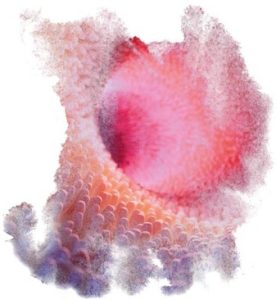
Production of antimicrobial substances, such as organic acids (mainly lactic, acetic, and formic acid), bacteriocins, hydrogen peroxide, and other compounds that inhibit intestinal pathogens (Corcionivoschi et al. 2010; Murali e Kavitha, 2010);
Production of enzymes (for example, proteases, amylases, lipases, and glycosidases) by
the microbiota. Bifidobacterium bifidum produces a DNA polymerase that has been described as important in the repair of damaged cells;
Reduction of toxic amines, which are produced by some intestinal microorganisms and have irritating and toxic activity or cause diarrhea;
Competition for nutrients and/or for attachment sites (competitive exclusion) in the intestinal mucosa with potentially pathogenic bacteria, thus preventing pathogenic bacteria from colonizing the intestinal tract;
Stimulation of the immune system, either directly or indirectly, by modulating
the commensal flora or the immune system. Probiotics play a role in the host’s specific and
nonspecific immune responses and in stimulating the production of pro and anti-inflammatory cytokines (O’Hara y Shanahan, 2006; Walsh et al., 2008; Wang et al., 2009).
Some probiotic strains act as immunomodulators, increasing macrophage activity and local antibody levels, inducing interferon production, and thus activating Natural Killer cells (Yasui et al. 1989; Perdigon et al. 2001).
Most commonly used probiotics as additives in animal nutrition
Lactobacillus [register]
Some species of the genus Lactobacillus used as feed additives have demonstrated beneficial abilities, particularly in reducing mortality in fish, improving growth performance
in piglets, and enhancing egg production and quality in poultry.
It is a Gram-positive bacterium belonging to the group of lactic acid-producing bacteria. Additionally, Lactobacillus has been associated with improving immune defense mechanisms
in fish and reducing Salmonella contamination in broiler chickens.
Bifidobacterium
Bifidobacteria are found in large numbers in the intestines of animals and humans. Their presence does not always indicate good intestinal health in the host. When used as a feed additive in piglets, the species Bifidobacterium pseudolongum showed significant results with improved feed conversion rate.
In poultry, the species Bifidobacterium animalis, Bifidobacterium thermophilum,
and Bifidobacterium longum demonstrated their ability to reduce coccidiosis in chickens infected with Eimeria tenella, protective activity against Salmonella and Listeria in
vitro, and against E. coli in chickens.
Overall, bacteria belonging to the genus Bifidobacterium have potential as additives for feed and as alternatives to conventional antibiotics.
Bacillus
Some bacteria of this genus, such as Bacillus subtilis, are regularly used as a dietary supplement,
especially in aquaculture and poultry farming. Various studies have shown that these species have a high potential for immunomodulation and protection against diseases.
Bacillus licheniformis has also shown probiotic abilities when used as an additive in pigs and has been effective against diarrhea occurring in piglets 3-10 days after weaning, caused by enterotoxigenic strains of E. coli.
However, some species such as Bacillus cereus can cause problems due to the endotoxins and emetic toxins they produce.
Enterococcus
Enterococcus is a common member of the endogenous intestinal microbiota of humans and animals. Enterococcus strains have been used as feed additives in poultry and pigs as alternatives to the use of antibiotics in feed.
The E. faecium strain has demonstrated its ability to stimulate other lactic acid bacteria (especially Lactobacillus) in the small intestine of turkeys and to improve feed conversion, intestinal morphology, and beneficial manipulation of cecal microflora in chickens.
However, the Enterococcus genus has some disadvantages as these bacteria can participate in the
transmission of antibiotic resistance.
Additionally, this genus is frequently associated with pathologies such as infections of the urogenital tract and endocarditis
Despite having demonstrated good results, the use of probiotics belonging to this genus should be verified beforehand to use only strains that pose no danger to the health of the animals.
Saccharomyces
Saccharomyces is a genus of yeast that is also part of the intestinal microbiota. Within this genus, S. cerevisiae is the most well-known species and is most commonly used as a probiotic.
It is recognized for improving the reproductive performance of sows, increasing the concentration of immunoglobulin G (IgG) in colostrum and subsequently in piglets’ plasma IgG to improve growth performance and promote “healthy” intestines in pigs.
Positive results from the use of S. cerevisiae have also been observed in fish. It is capable of improving the growth, hematological, antioxidant, and immunological responses of Nile tilapia, enhancing Nile tilapia’s resistance against a pathogenic fungus, as well as increasing the innate immune response of golden dorado. Other species belonging to this genus, such as Saccharomyces carlsbergensis, are also used as probiotics in animal nutrition.
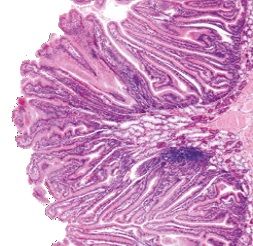
Prebiotics
The concept of prebiotics was first described in 1995 by Gibson and Robertfroid (1995) and has undergone some changes over time (Table 1).
Definition of prebiotics
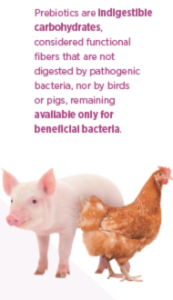
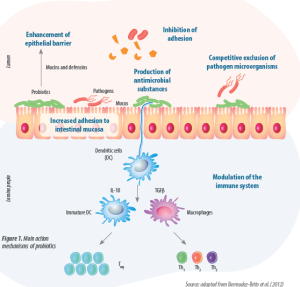
There are several prebiotics that can be used in animal nutrition, such as:
MOS, GOS, and FOS are the most studied and used prebiotics as additives in animal nutrition.
According to Wang (2009), there are five basic criteria for classifying feeds as prebiotics:
1. Resistance to digestion in the upper sections of the gastrointestinal tract.
2. Fermentation by the intestinal microbiota.
3. Beneficial effect on the health of the host.
4. Selective stimulation for the growth of probiotic microorganisms.
5. Stability under various feed processing conditions.
Mode of action
The mechanisms of action of prebiotics include blocking the receptor portion for bacterial adhesion; modulation of immunity produced by antibacterial compounds; increasing exudation in the intestinal lumen; as well as inducing morphological alteration in the intestinal structure (Pourabedin y Zhao., 2015; Hammed, 2021).
In this way, the acidic environment in the colon can alter the composition of the microbiota,
which helps suppress the growth of some potential pathogens such as E. coli, Clostridium,
Streptococcus faecalis, and Proteus, and increases the growth of some beneficial bacteria, including
bifidobacteria, lactobacilli, and Eubacterium (Morrison and Preston, 2016; O’Callaghan and
van Sinderen, 2016; Zhang et al., 2015).
Prebiotics can stimulate or modulate the immune system. One of the mechanisms of immunological modulation by prebiotics is attributed to the stimulation of humoral immunity through the interaction of sugar with specific receptors located on macrophages and dendritic cells, which induce the release of cytokines and the proliferation of lymphocytes (Saad et al., 2013).
Prebiotics are not digested in the upper GI tract and are believed to be fermented by specific bacteria when they reach the colon. The environment in the colon is suitable for fermentation and growth of commensal bacteria due to its slow transit, availability of nutrients, and pH
The fermentation of carbohydrates in the colon leads to the production of short-chain fatty acids (SCFAs), primarily acetate, propionate, butyrate, and other metabolites such as lactate, pyruvate, ethanol, and succinate (Janssen y Kersten, 2015; Sarbini y Rastall, 2011; Slavin, 2013).
SCFAs are important because they can reduce protein fermentation in the intestinal tract. Butyrate, for example, regulates cell growth and induces differentiation and apoptosis in the small intestine, resulting in improved cell proliferation as well as better digestion and absorption in the small intestine (Linberg, 2014; van der Aar et al., 2017).
The presence of prebiotics such as oligosaccharides in the intestine can also increase the resistance of probiotic strains due to bacterial adhesion properties. Oligosaccharides also help maintain the integrity of the intestinal mucosa, increasing villi height, mucin release, and mucosal biofilm composition (Wan et al., 2018a; Yasmin et al., 2015).
Some probiotics can modulate the immune system by binding to the G protein receptors within the gut-associated lymphoid tissue (GALT). Another mode of action is via stimulation of mucus production, decreasing the connection between bacteria and the epithelial barrier, increasing cellular resistance, and secretion of immunoglobulin A (IgA) (Bischoff et al., 2014; Celi et al., 2019).
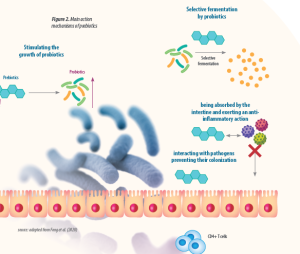
Some specific types of prebiotics, such as COS, inulin, AXOS, and AOS, have been associated
with immunomodulatory effects in monogastric animals (Ding et al., 2018; Vogt et al., 2015;
Wan et al., 2018b; Xiong et al., 2015).
A review by Seifert and Watzl (2007) concludes that the addition of inulin and FOS to the diet has an effect on the immune system, with a positive impact on immunological biomarkers in intestine-associated lymphoid tissues.
Several studies have shown that prebiotics positively affect the functionality of the immune system, altering the expression of proinflammatory cytokines (Hu et al., 2018; Wan et al., 2018a; Wang et al., 2016a; Xiao et al., 2016).
In turn, higher concentrations of XOS (between 0.1 and 0.5 g/kg) demonstrated an improvement
in bone mineralization (Wang et al., 2017).
It can be observed that the use of pre- and probiotics is beneficial for the health, well-being, and productive efficiency of poultry and pigs. These additives can bring various benefits to animal production, especially with the increasing restrictions on antibiotics.
You may also like to read: “Microbiome Dynamics in Poultry Production: Implications for Health and Welfare”
[/register]